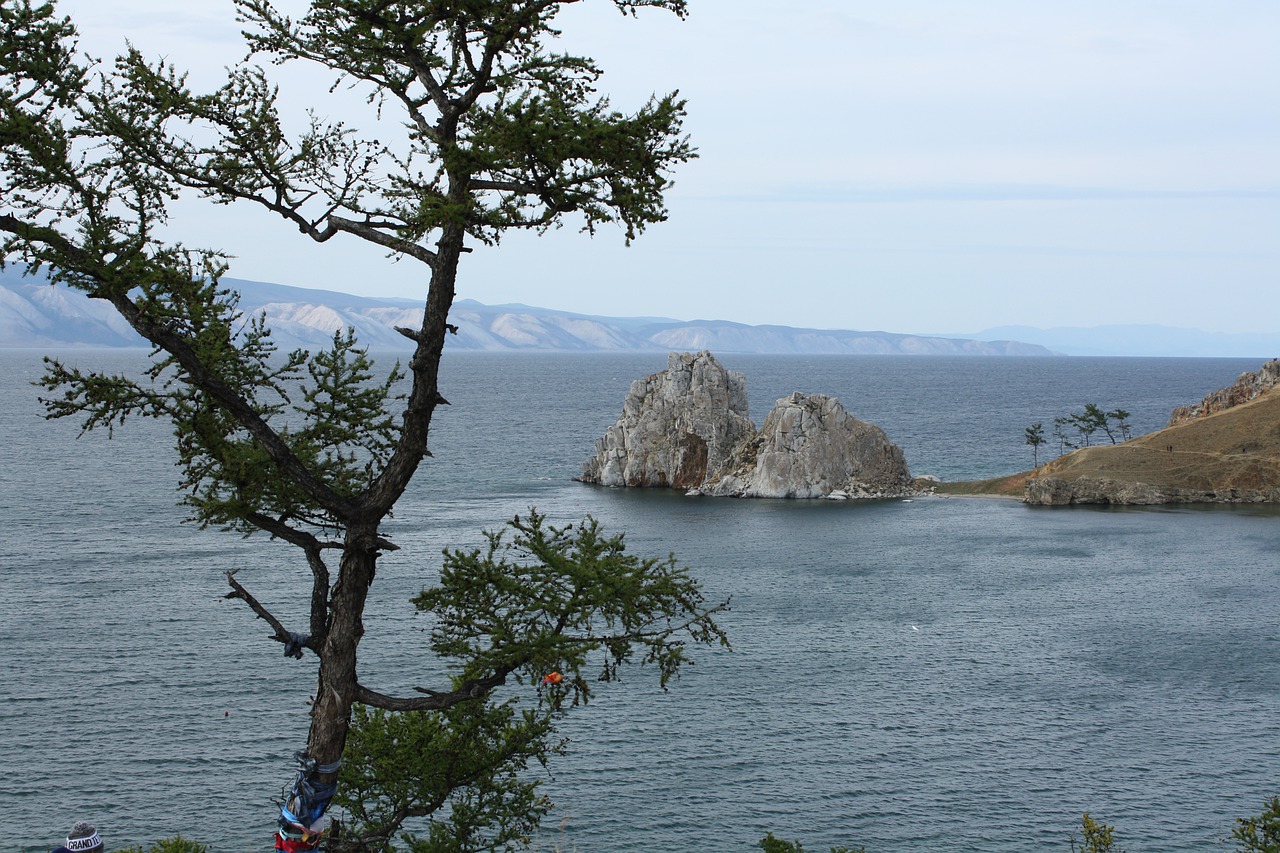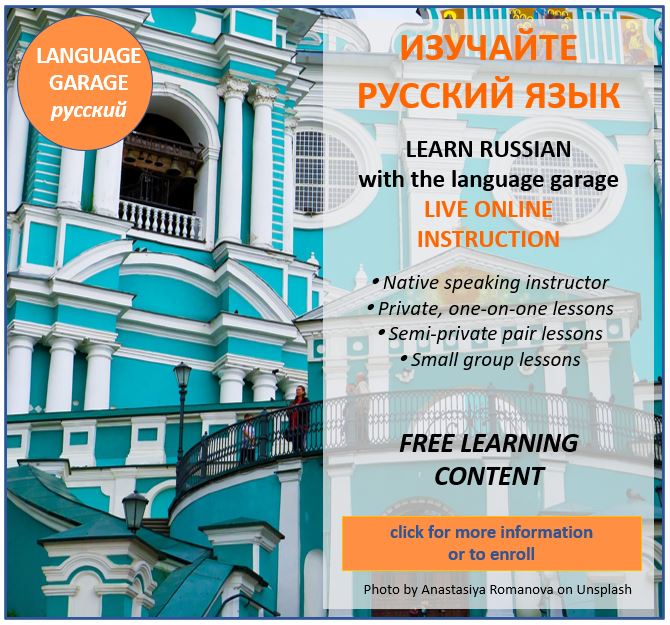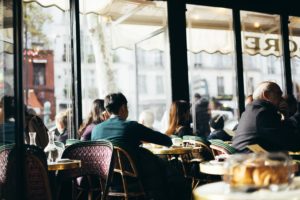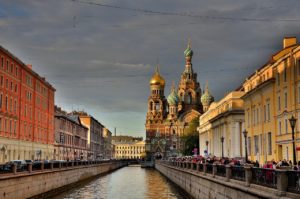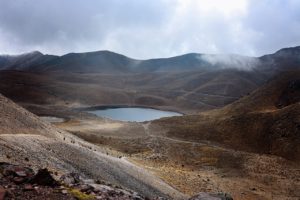Image source.
In this post we’ll learn some vocabulary and expressions that you can use to talk about the natural world.
Цветы, Деревья, Трава, и Свежий Воздух: Flowers, Trees, Grass, and Fresh Air
Let’s start with some basics of nature that you can find around you even if most of the nature you see is in a park: дерево (n) (a tree), цветок (m) (a flower), сад (m) (a garden), трава (f) (grass), растение (n) (a plant), озеро (n) (a lake), пруд (m) (a pond), тропа (f) (a path), лес (m) (woods). You’re probably not going to see much wildlife in a park, but if you’d like to know how to talk about the animals you do see, check out this post.
- В парке много деревьев.
There are lots of trees in the park. - Посмотри(те) на этот красивый цветок.
Look at that beautiful flower. - Давай(те) сядем в траву/посидим на траве.
Let’s sit in the grass.
- Давай(те) посидим на скамейке рядом с садом.
Let’s sit on the bench next to the garden. - Есть тропа через лес.
There’s a path through the woods. - Давай(те) погуляем вокруг пруда.
Let’s walk around the pond. - В этом озере есть рыба?
Are there fish in this lake? - Это озеро мелкое или глубокое?
Is the lake shallow or deep?
Деревья и Растения: Trees and Plants
No matter where we are, there’s usually some kind of plant life around us, even if it’s in a pot in the corner of your office: комнатное растение (n) (houseplant), цветочный горшок (m) (flowerpot), роза (f) (rose), шип (m) (thorn), почва (f) (soil), лист, листок (m) (leaf), жёлудь (m) (acorn), стебель (m) (stem), семя (n) (seed), орех (m) (nut), поливать/полить растение (to water a plant), сажать/посадить семя (to plant a seed), цвести; цветы цветут (to bloom; flowers bloom), расти; растения растут (to grow; plants grow).
- Мне надо полить мои цветы.
I need to water my plants. - У нас много комнатных растений.
We have a lot of houseplants. - Это красивый цветочный горшок.
That’s a beautiful flowerpot. - Листья этого растения коричневеют.
That plant’s leaves are turning brown. - Жёлуди падают с дерева.
Acorns are falling from the tree. - У роз есть шипы на стеблях.
Roses have thorns on their stems. - Это клён или дуб?
Is that tree a maple or an oak? - Сосны – зелёные/зелены зимой.
Pine trees are green in the winter. - Я посадил(а) семена помидоров в саду.
I planted tomato seeds in the garden. - Цветы цветут весной.
The flowers bloom in the spring. - Растения в твоём саду растут быстро.
The plants in your garden are growing quickly.
Холмы, Реки, и Долины Hills, Rivers, and Valleys
Let’s add some more nature vocabulary: холм (m) (hill), долина (f) (valley), река (f) (river), поток, ручей (m) (stream), водопад (m) (waterfall); поле (n) (field), луг (m) (meadow), камень (m) (rock), валун (m) (boulder), болото (n), трясина (f) (swamp).
- Наш дом на холме.
Our house is on a hill. - Мы живём рядом с рекой.
We live next to a river. - Река здесь течёт быстро.
The river runs quickly here. - Есть красивый водопад рядом.
There’s a beautiful waterfall nearby. - В долине много ферм.
There are a lot of farms in the valley. - Рядом с нашим домом в лесу есть небольшой ручей.
There is a little stream in the woods near our house. - Мы перешли через поле.
We walked across the field. - На лугу растут красивые полевые цветы.
There are beautiful wild flowers in the meadow. - На склоне холма много камней и валунов.
There are a lot of rocks and boulders on the hillside. - Эта дорога идёт через трясину.
This road goes through a swamp.
Горы и Леса Mountains and Forests
If you ever get to the mountains, you may need to say: гора (f) (a mountain); горная гряда, цепь (f), хребет (m) (a mountain range); вершина горы (the summit of the mountain); идти/ходить в поход в горы (to hike in the mountains); забираться/взобраться на гору//покорять гору (to climb a mountain); пик (m) (a peak); утёс (m) (a cliff); лес (m) (a forest); разбивать/разбить лагерь в лесу (to camp in the forest); сосны (pl) (pine trees); клёны (pl) (maple trees); дубы (pl) (oak trees); берёзы (pl) (birch trees); дикие животные (pl) (wild animals).
- В этой стране два горных хребта.
There are two mountain ranges in this country. - Из нашего окна видны красивые горы.
We can see beautiful mountains from our window. - Как высоко вершина этой горы?
How high is the summit of this mountain? - Горные пики покрыты снегом.
The mountain peaks are covered in snow. - Какова высота этих утёсов?
How high are those cliffs? - Я люблю ночевать в лесу в палатке.
I like to camp in the forest. - В этом лесу есть сосны, клёны, берёзы, дубы.
There are pine trees/maple trees/birch trees/oak trees in this forest. - В этом лесу есть дикие животные?
Are there wild animals in this forest?
Мир The World
Let’s finish with some geographical terms that you can use to talk about the natural world. континент (m) (continent), океан (m) (ocean), море (n) (sea), залив (m) (bay), берег (m), побережье (n) (coast), остров (m) (island), полуостров (m) (peninsula), пустыня (f) (desert), джунгли (pl) (jungle), ледник (m) (glacier), айсберг (m) (iceberg), северный/южный полюс (m) (north/south pole), север/юг/восток/запад (m) (north/south/east/west).
- Сколько есть континентов?
How many continents are there? - Океан широк и глубок.
The ocean is wide and deep. - Я люблю купаться/плавать в море.
I love swimming in the sea. - Река впадает в большой залив.
The river empties into a big bay. - Мы ехали вдоль побережья.
We drove along the coast. - Чтобы попасть на остров, нужно сесть на паром.
You have to take a ferry to get to the island. - Пустыня горяча и суха.
The desert is hot and dry. - В джунглях живёт много разных растений и животных.
Many different plants and animals live in the jungle. - Ледники становятся меньше и меньше.
The glaciers are getting smaller and smaller. - В океане около северного/южного полюса есть айсберги.
There are icebergs in the ocean near the north/south pole. - Солнце встаёт на востоке и садится на западе.
The sun rises in the east and sets in the west.
Do you want to learn Russian?
Check out our other posts on Russian language, culture, and more. And if you’re looking for convenient and affordable live Russian lessons with a real teacher, check out The Language Garage Russian. Our lessons are given online in a virtual classroom, so it doesn’t matter where you live or work. We can come to you. And we have flexible options, with a free trial so that you can decide if there’s a fit. Check us out!
